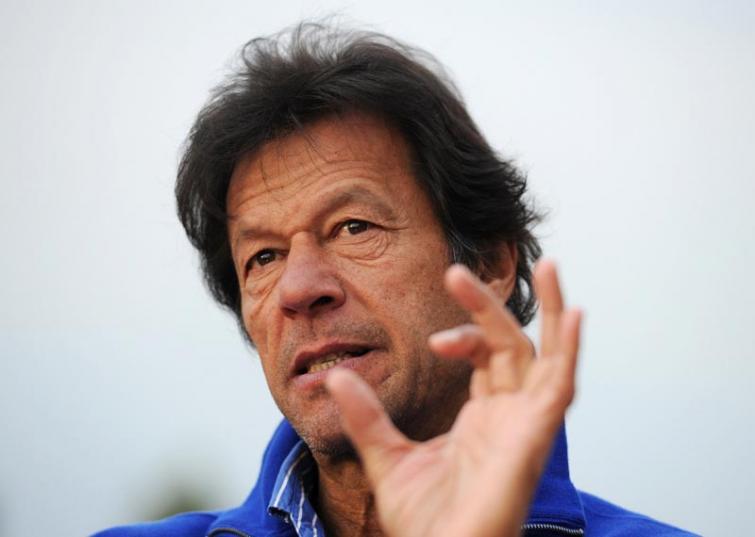 Xinjiang
Xinjiang Pakistan prime minister’s expedient silence over the plight of Uyghur Muslims in China’s Xinjiang
Pakistan Prime Minister Imran Khan’s recent interview where he displays excruciating coyness not to say anything even remotely critical of let alone offensive to China about its torturous treatment of the Uyghur Muslims in Xinjiang Province has received considerable media attention.
Khan spoke to Jonathan Swan, an Australian journalist working for America’s well-known news outlet Axios, and it was broadcast on HBO. It is a wide-ranging interview which among other things deals with the brutal reeducation camps that China has confined the Uyghur Muslims to as part of its policy to culturally homogenize them with the mainstream Han Chinese culture. Beijing’s approach is being viewed around the world as genocide in some quarters while the Chinese government has consistently dismissed those concerns.
Since Pakistan has often projected itself as a custodian of pan-Islamic interests beyond its border it was only fair that Swan asked Khan about his country’s strange silence over the plight of the Uyghurs. Khan’s response was one of a leader deeply beholden to China for various reasons, including, more specifically, massive financial aid and investment in his country.
It is no news that politicians have selective and expedient outrage over various issues. In Pakistan’s case when it comes to the Uyghurs and China that expediency becomes luridly highlighted. To be accurate, Khan does say what is expected of a leader in his position.
“What our conversation is with the Chinese, this is not the case, according to them,” says Khan of the crisis in Xinjiang. “Whatever issues we have with the Chinese we speak to them behind closed doors. China has been one of our greatest friends in our most difficult times. When we were really struggling, our economy was really struggling, China came to our rescue,” he says.
And that is the motivating factor behind Khan's touching acceptance of the Chinese denial of any wrongdoing Xinjiang. It stems from his country's economic addiction to the Chinese money. Debt bends morality like nothing else.
It should hardly surprise anyone, the least of all a journalist, that a politician engages in expediency, in Khan’s case economic expediency in publicly keeping silent on the Uyghurs even while vehemently running to the rescue of Muslims in Indian Kashmir. His flagrant whataboutery should not surprise anyone either.
He tells Swan that he is not convinced about the ordeal of the Uyghurs because Beijing denies it. Well, New Delhi denies that Kashmiris are mistreated too.
The logic here is quite simple. Khan and many Pakistanis see the plight of the Kashmiri Muslims in mainly territorial terms, meaning they want the whole of Kashmir to be theirs. They do not necessarily see it in cultural and religious terms despite their pretensions to the contrary. Xinjiang on the other hand has no history of territorial dispute between Pakistan and China. Add to that the massive economic assistance that China extends to Pakistan creating generational indebtedness and the Uyghurs cease to exist altogether for Islamabad.
For instance, since its official launch in April 2015, the China-Pakistan Economic Corridor (CPEC) has infused $25 billion into the country. The CPEC is part of Chinese President Xi Jinping’s massively ambitious Belt and Road Initiative (BRI).
As of April 2021, Pakistan’s external debt is reported to be $90.12 billion of which its obligation to China alone was $24.7 billion which is more than a quarter of its external debt. With a burden like this looming over its head, expressing candid view on China’s internal matters, even if it involves Pakistan’s favorite constituency, Muslims of the world, is out of the question.
To dilute his expediency the prime minister does argue this: “I look around the world, what’s happening in Palestine, Libya, Somalia, Syria, Afghanistan…am I going to start talking about everything? I concentrate on what is happening on my border, in my country …that is part of Pakistan. 100,000 Kashmiris are dying. It concerns me more.”
At that point he might as well have said that Pakistan wants the territory of Kashmir and the people, namely Muslims, who come with it are incidental.
Perhaps as an experiment India should offer Pakistan Indian Kashmir’s territory without its people. Let us see if they would insist that they will take the territory only if the Kashmiri Muslims come with it. They will happily take the land at the cost of those who live on it.
Prime Minister Khan insists that when it comes the Uyghurs, “We speak to them (China) behind closed doors.” If the Chinese do not let the Pakistani leadership talk about the Uyghurs in public, are we being told that they would indulge them privately? It is laughable.
It would have been so much better had Khan instead said, “Pakistan cannot be the custodians of world Muslims but those we think are expedient to us.”
(The writer is a Chicago-based journalist, author, filmmaker and commentator who does regular news segments under Mayank Chhaya Reports. The views expressed here are personal. He can be contacted at mcsix@outlook.com)
South Asia Monitor/IBNS
Support Our Journalism
We cannot do without you.. your contribution supports unbiased journalism
IBNS is not driven by any ism- not wokeism, not racism, not skewed secularism, not hyper right-wing or left liberal ideals, nor by any hardline religious beliefs or hyper nationalism. We want to serve you good old objective news, as they are. We do not judge or preach. We let people decide for themselves. We only try to present factual and well-sourced news.







